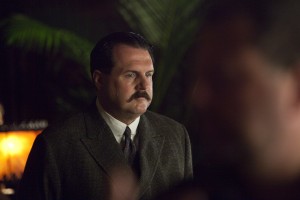Fox alumnus Edward McGinty in character as Ward Boss Boyd. Photo courtesy of HBO.
Although the HBO series Boardwalk Empire is a work of historical fiction, Fox School alumnus Edward McGinty, BBA ’89, the show’s research advisor, helps ensure that the writers’ words are backed up with historical facts. Here, he talks about how growing up in Atlantic City helped land him a job on the acclaimed series.
How did you connect with Terence Winter, the show’s creator?
After graduating from Temple, I went to film school at Columbia University, where I met Terence Winter at a Q-and-A screening with the cast of The Sopranos. A few years later, Terry mentioned that he was writing a project about Prohibition in Atlantic City to a friend of mine from film school. My friend said, “You’ve got to meet my friend Eddie, he grew up in Atlantic City and knows everything there is to know about the town.”
What was that first meeting like?
I brought as much research material as I could carry to the meeting. My grandfather and my father, Ed Sr., ENG ’56, had worked at the Ritz Carlton, where the real Nucky lived. At the end of the meeting, I showed a photo of my grandfather wearing his bellman’s uniform, standing on the boardwalk in front of the Ritz. Terry looked at it and said, “You’re hired!” I think I may have been the first person on the payroll.
So growing up in Atlantic City gave you an edge?
Absolutely. I brought a lot of first-hand knowledge to the table. I was always fascinated by the history of the city I grew up in. I had always heard stories from my Dad about growing up in Atlantic City, so there was a lot of family history I could refer to. And [Temple History Professor] Bryant Simon’s book, Boardwalk of Dreams: Atlantic City and the Fate of Urban America, sat next to Nelson Johnson’s Boardwalk Empire: The Birth, High Times, and Corruption of Atlantic City [on which the HBO series is based] on my bookshelf for years. Those are two of my personal favorite books about the history of Atlantic City.
What does your father say about your work on the show?
The high point of my life was taking my Dad to see the Boardwalk set in Brooklyn. When he saw it for the first time, he stopped in his tracks. He climbed the stairs to the boardwalk they had built and leaned on the railing and said, “You guys really nailed it.”
What does being a researcher for the show entail?
The writing staff comes up with the storylines, and I support them with as much historical research as I can about the time period. If they have any questions along the way, I find the answer by searching the Internet, going to libraries, calling on experts, etc. Anything I need to do to find answers as quickly as possible. When the script comes out, I go back through it and fact-check, making sure that everything is on the mark. Everyone on the show does their best to make sure the historical elements are as authentic as possible.
You appeared on screen during the first few seasons as Ward Boss Boyd. How did that happen?
One day I was sitting in the writer’s room, and Terry looked across the table and said, “You kind of look like a character from back then. You should audition.” I brushed it off, but he persisted. I had trained as an actor at the American Conservatory Theater, but I hadn’t auditioned in a few years, so I was extremely nervous. But I got the part. The fun thing is that my character was named after a real ward boss, who was my grandfather’s fishing buddy. So much of this show for me has been due to good luck and great fortune. The best part of it all has been having a mentor like Terence Winter to learn from.
Did you draw on your experience in Philadelphia while researching the storyline for Willie Thompson, who was a student at Temple this season?
Terry had the initial idea to have Willie go to Temple, and it made a lot of sense. When I went to Temple as an undergrad, there was a big contingent of Atlantic City kids there. So I was able to add a lot of first-hand knowledge to my research. On top of that, the Temple Library staff was very helpful. They pointed me to a number of digitized documents and yearbooks from the era. Also, [Professor Emeritus] Jim Hilty’s book, Temple University: 125 Years of Service to Philadelphia, the Nation, and the World, was an invaluable resource. Every Temple student and alumnus should have a copy of that book on their shelf.

